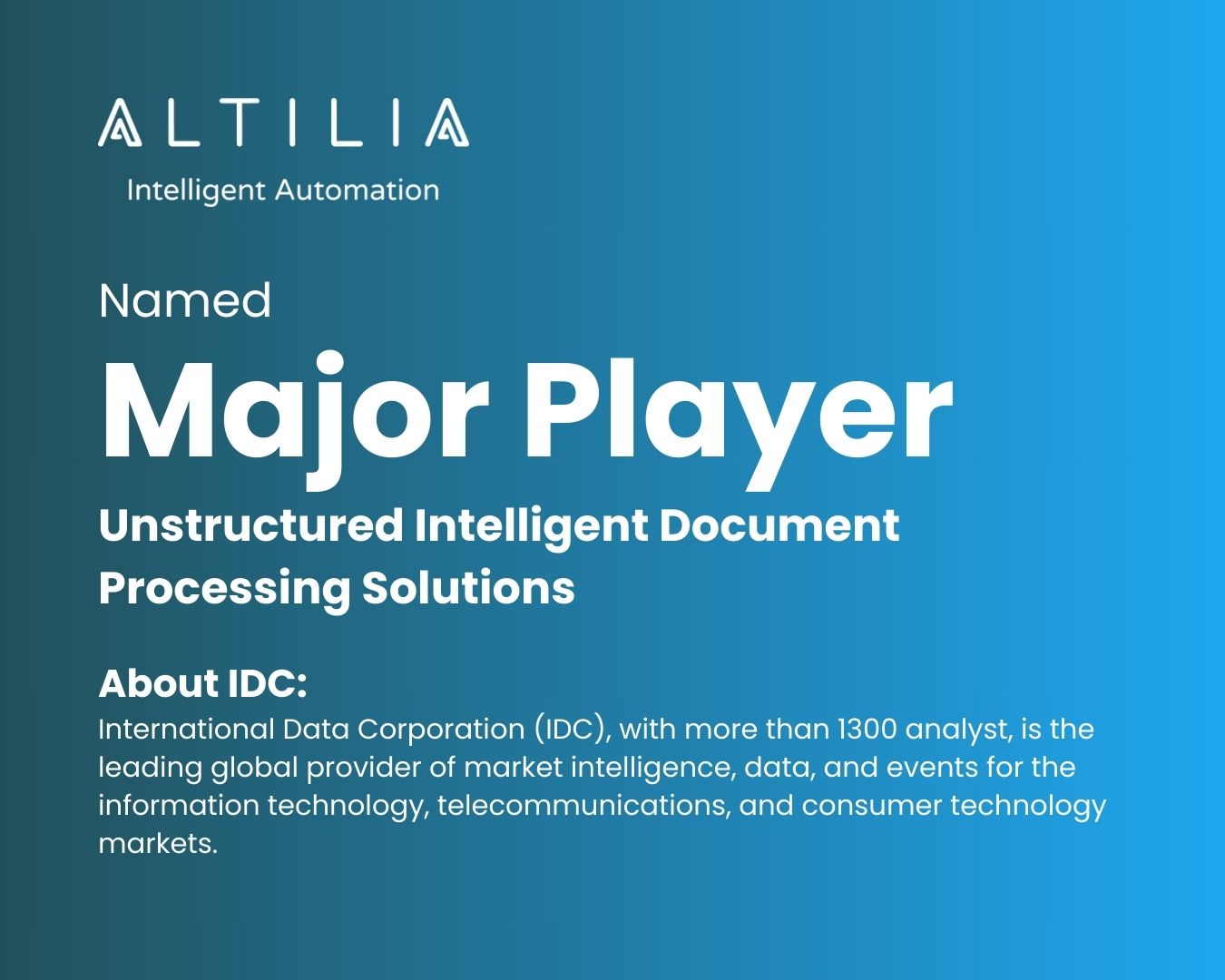Rende/Milan, July 25th, 2022. Altilia, the Italian deep-tech company has been included in the first Gartner® Market Guide report on Intelligent Document Processing, published in February 2022 (1).
Altilia Intelligent Automation™ has been included among other representative vendor’s solutions. In another 2021 Gartner report (2) Altilia was listed among the representative IDP software provider among other companies competing in a fast-growing market.
In that same report, outlining the IDP competitive landscape, Gartner underlined the role of Unstructured data specialists.
“These are new providers in the IDP space, mostly sprung up in the last five years or so. They are usually venture capital (VC)-funded companies. Their key value proposition is that they have an AI-led approach to focus primarily on semistructured and unstructured data (often a strong focus on handwritten documents) that is their core value proposition. They mostly partner for OCR engines”. (2)
Defining the IDP market, in its first report specifically focused on Intelligent Document Processing solutions Gartner states that;
“Intelligent document processing (IDP) solutions extract data to support automation of high-volume, repetitive document processing tasks and for analysis and insight. IDP uses natural language technologies and computer vision to extract data from structured and unstructured content, especially from documents, to support automation and augmentation”.(1)
According to this Gartner’s February 2022 report, Altilia currently mostly serves industries : “Banking, insurance, utilities, retail, securities” and list most commonly process documents for Altilia: “Annual/sustainability/interim/financial reports, balance sheets, Invoices, orders, Social media posts, news, bank statements, paychecks”
Gartner lists ‘Establishing a Marketplace as a Viable Channel in Their Go-to- Market’ as one of the competitive trends about IDP Competitive Landscape
The report observes “early signs of establishing the marketplace as a channel as part of the go-to-market (GTM) approach of the IDP vendors”.(2)
Altilia is among a small numbers of vendors developing their own marketplaces.
This means transitioning from the traditional approach (bespoke project with project and implementation times and costs) to a ‘out of the box’ approach with bundled solutions ready to use.
Altilia’s team of 40 Scientists, Engineers, Innovators, Growth Hackers are building a no-code SaaS platform, that democratizes the adoption of AI, hyperautomation and decision intelligence for large corporations and SMEs in Finance and a number of other industries. This platform will be available also as a tool from the Altilia.ai website and will be exploitable from day 1 with a minimum of training without any knowledge of AI.
Reference
1. Gartner “Market Guide for Intelligent Document Processing Solutions” Shubhangi Vashisth, Anthony Mullen, Stephen Emmott, Alejandra Lozada, February 2022
2. Gartner, “Competitive Landscape: Intelligent Document Processing Platform Providers,” Arup Roy, Arthur Villa, Cathy Tornbohm, Soyeb Barot, November 8, 2021.
GARTNER is a registered trademark and service mark of Gartner, Inc. and/or its affiliates in the U.S. and internationally and is used herein with permission. All rights reserved. Gartner does not endorse any vendor, product or service depicted in its research publications, and does not advise technology users to select only those vendors with the highest ratings or other designation. Gartner research publications consist of the opinions of Gartner’s research organization and should not be construed as statements of fact. Gartner disclaims all warranties, expressed or implied, with respect to this research, including any warranties of merchantability or fitness for a particular purpose.




